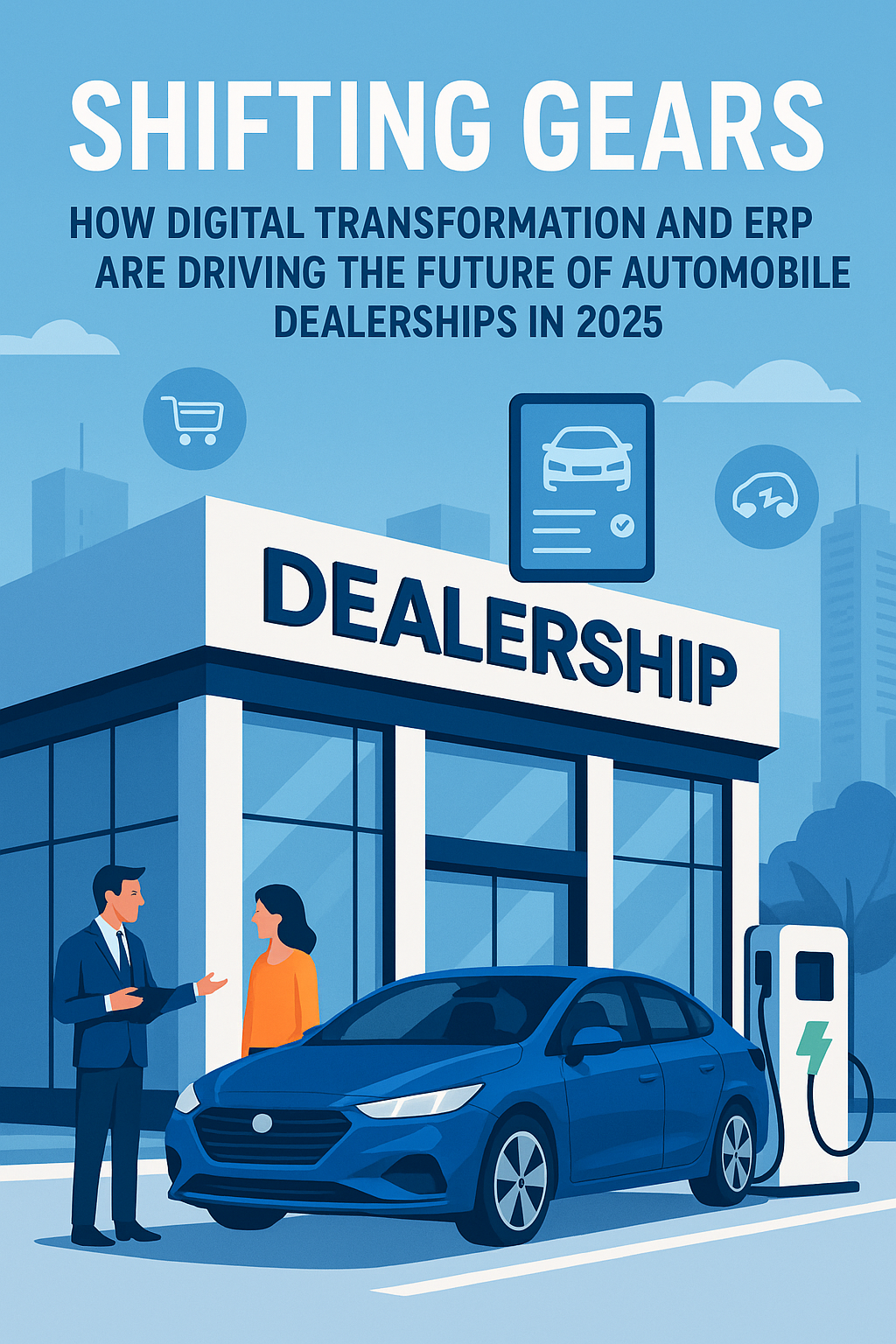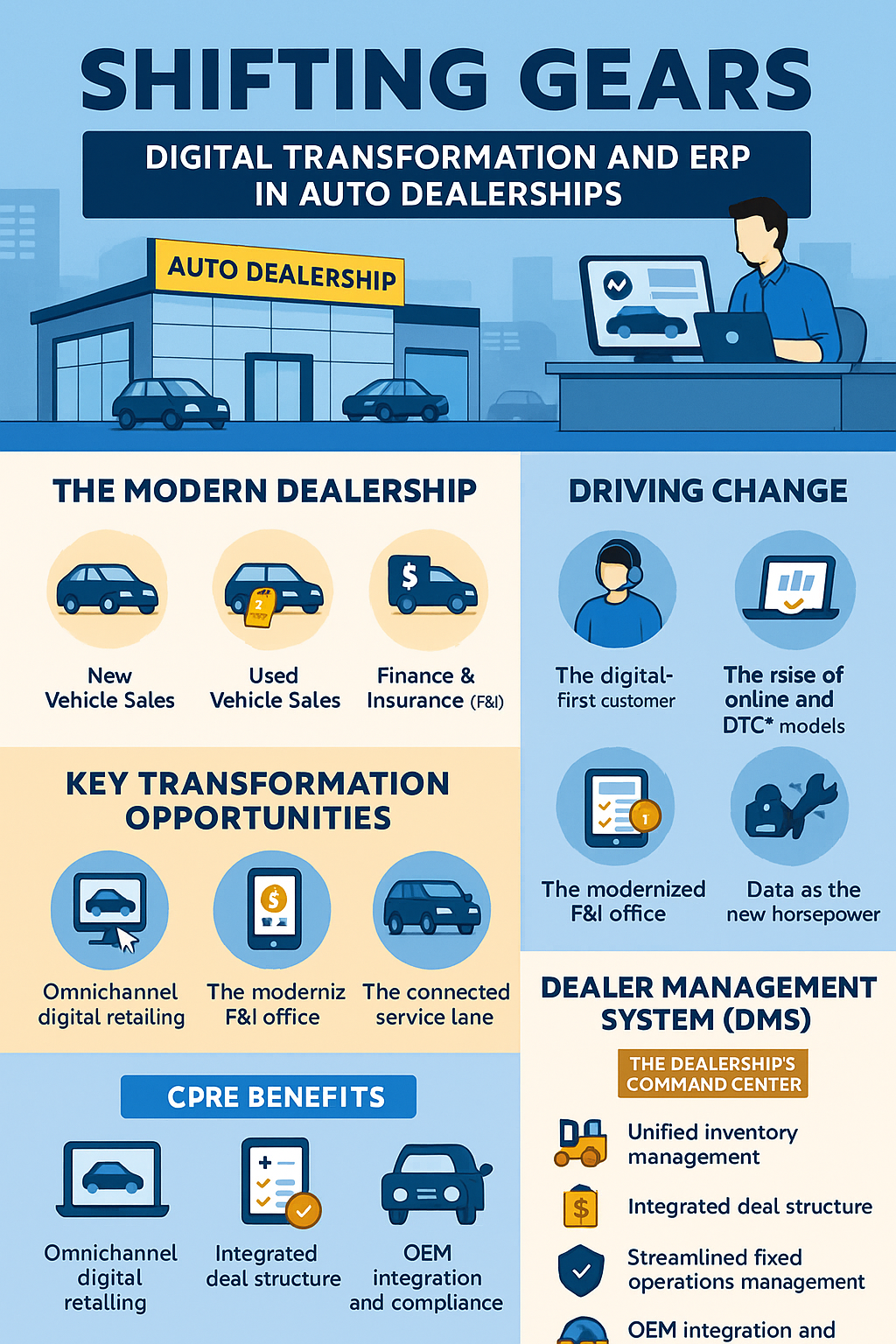Shifting Gears: How Digital Transformation and ERP are Driving the Future of Automobile Dealerships in 2025
2025-08-20 · By Anil Kancharla · 8 min read
❤️ 0 Likes · 👁️ 0 Views
 AI-generated image for illustration purposes only.
AI-generated image for illustration purposes only.
Shifting Gears: How Digital Transformation and ERP are Driving the Future of Automobile Dealerships in 2025
 AI-generated image for illustration purposes only.
AI-generated image for illustration purposes only.
Shifting Gears: How Digital Transformation and ERP are Driving the Future of Automobile Dealerships in 2025
For generations, these institutions have been the unchallenged epicenter of the car buying universe. But in 2025, the ground beneath them is shifting with seismic force. The modern auto dealership is no longer just a place to buy a car; it's a complex retail and service business navigating a complete industry reinvention.
Today's dealerships are grappling with a new breed of customer who expects a seamless, Amazon-like digital experience. They face the monumental transition to electric vehicles (EVs), intense competition from online-only retailers, and even the looming prospect of direct-to-consumer (DTC) models from their own manufacturing partners. In this high-stakes environment, clinging to the old ways of doing business is a roadmap to obsolescence.
The key to navigating this new terrain and winning the race for the modern customer is digital transformation. And the engine powering this entire journey, the central command center for every sale, every service, and every customer interaction, is the dealership's Enterprise Resource Planning (ERP) software, known in this industry as the Dealer Management System (DMS).
This in-depth blog post will explore the state of the modern auto dealership, uncover the immense opportunities of its digital evolution, and provide a comparative analysis of leading ERP/DMS solutions that are helping dealers build a more resilient and profitable future.
The Modern Dealership: More Than Just a Showroom
To understand the impact of digital transformation, one must first appreciate the intricate, multi-faceted nature of a modern dealership. It's effectively four businesses under one roof.
1.New Vehicle Sales: The most visible part of the business, involving managing inventory from the Original Equipment Manufacturer (OEM), marketing, and navigating the complex sales process from test drive to delivery.
2.Used Vehicle Sales: A critical profit center that involves acquiring pre-owned vehicles (through trade-ins, auctions), reconditioning them for sale, and managing a dynamic pricing and inventory strategy.
3.Finance & Insurance (F&I): This department is a major driver of dealership profitability. F&I managers work with lenders to secure financing for customers and offer a menu of aftermarket products like extended warranties, GAP insurance, and service contracts.
4.Fixed Operations (Service & Parts): Often called the backbone of the dealership, this includes the service department for maintenance and repairs and the parts department that supports both the service bays and retail customers. Fixed ops provide a consistent, high-margin revenue stream that helps stabilize the business against the fluctuations of vehicle sales.
Driving Change: The Forces Remaking Auto Retail
The pressures facing dealers in 2025 are not just competitive; they are transformative, forcing a fundamental rethink of the entire business model.
- The Digital-First Customer: Today’s car buyer has already done extensive research online. They arrive at the dealership armed with information and expect a fast, transparent, and personalized experience. They want to complete as much of the process online as possible—from vehicle selection and trade-in appraisal to credit applications and F&I product selection.
- The Electric Vehicle (EV) Revolution: The shift to EVs impacts every corner of the dealership. Sales staff need new expertise to explain battery range, charging, and government incentives. The service department must invest in new equipment and technician training for high-voltage systems. Parts departments must manage an entirely new category of inventory.
- The Rise of Online Retailers and DTC Models: Companies like Carvana and Vroom have normalized the online car buying experience. Simultaneously, some OEMs (like Tesla, Rivian, and others) are exploring Direct-to-Consumer models, threatening the traditional franchise system and forcing traditional dealers to prove their value proposition.
- Data as the New Horsepower: Modern vehicles are rolling computers, generating vast amounts of telematics data. The dealership that can effectively capture and use customer and vehicle data—to personalize marketing, anticipate service needs, and streamline operations—will have a significant competitive advantage.
The Digital Dealership: Key Transformation Opportunities
Digital transformation provides a powerful suite of tools to meet these challenges head-on, allowing dealers to create a more efficient, profitable, and customer-centric operation.
-
Omnichannel Digital Retailing: This is the holy grail of modern auto retail. It means creating a seamless, unified experience that allows a customer to start their journey online, transition to the showroom for a test drive, and finalize the paperwork on their tablet at home—all without losing their data or having to repeat steps. It blends the best of digital convenience with the essential human touch of the dealership.
-
The Modernized F&I Office: The traditionally slow and opaque F&I process is being transformed. Digital F&I tools allow for transparent menu selling on tablets, e-contracting to reduce paperwork and errors, and the ability for customers to review and select products at their own pace, improving both efficiency and customer satisfaction.
-
The Connected Service Lane: Technology is revolutionizing fixed operations. This includes:
- Online Service Scheduling: Allowing customers to book appointments 24/7.
- Digital Vehicle Inspections (DVIs): Technicians can use tablets to document repair needs with photos and videos, which are then sent directly to the customer for transparent approval.
- IoT and Telematics: Using vehicle data to proactively alert customers about upcoming maintenance needs, turning the service visit from a reactive event into a planned, convenient one.
-
Advanced Customer Relationship Management (CRM): A modern, auto-specific CRM goes beyond sending generic email blasts. It provides a 360-degree view of the customer, tracking every interaction from their first website visit to their most recent oil change. This allows for hyper-personalized marketing and communication, building long-term loyalty across the entire ownership lifecycle.
The Command Center: ERP/DMS as the Dealership's Operating System
With data flowing from the website, the showroom, the service bay, and the OEM, how does a dealer connect it all? How can a General Manager get a real-time view of the profitability of every department? This is the mission-critical role of the Dealer Management System (DMS), the industry-specific ERP for auto retail.
The DMS is the dealership’s single source of truth. It integrates every piece of data and every workflow—from inventory and sales to F&I, service, and accounting—into one unified platform.
Core Benefits of a Modern DMS:
- Unified Inventory Management: Provides real-time tracking of every vehicle (new and used) and every part, from acquisition to sale, including costs, reconditioning status, and aging.
- Integrated Deal Structure: Connects the sales desk, F&I office, and accounting department on a single deal, ensuring that vehicle costs, trade-in values, financing, and aftermarket products are all calculated accurately and flow seamlessly onto the final contract.
- Streamlined Fixed Operations Management: Manages everything in the back of the house, from service appointment scheduling and technician dispatching to parts ordering and invoicing.
- OEM Integration and Compliance: Provides certified integrations with manufacturer systems for vehicle ordering, warranty claims processing, and financial statement reporting.
- Data Analytics and Reporting: A modern DMS offers powerful business intelligence tools, allowing dealer principals and managers to instantly view key performance indicators (KPIs) for every department and make data-driven decisions.
Choosing Your Engine: A Look at Leading DMS/ERP Providers
The DMS market is dominated by a few key players who offer comprehensive, end-to-end solutions for dealerships.
 AI-generated image for illustration purposes only.
AI-generated image for illustration purposes only.
Key Differentiators at a Glance:
- Openness vs. a Walled Garden: CDK Global is actively championing a more open platform approach with Fortellis, allowing dealers more flexibility to choose and integrate third-party tools. Reynolds and Reynolds historically favors a more closed, "walled garden" approach, arguing that it provides a more stable, secure, and seamlessly integrated user experience with their proprietary solutions.
- Ecosystem Advantage: Cox Automotive's Dealertrack DMS has a unique and powerful advantage due to its native integration with the rest of the Cox ecosystem. A dealer using Dealertrack can manage everything from vehicle acquisition at a Manheim auction to marketing it on Autotrader and finalizing the deal in the DMS, all on a highly connected platform.
- Digital Retailing: All three providers offer robust digital retailing solutions (e.g., CDK's Connected Store, Reynolds's Gubagoo, Dealertrack's Digital Retailing) designed to facilitate the omnichannel journey. The choice often comes down to the depth of integration with the core DMS and the dealer's preferred workflow.
The Road Ahead: Building the Dealership of the Future
The automobile dealership is not disappearing; it is evolving. The winners in this new era will be those who embrace technology not as a necessary cost, but as a strategic enabler. They will be the ones who use digital tools to create a transparent, convenient, and personalized customer experience that online-only retailers cannot replicate.
By leveraging the power of a modern, integrated DMS/ERP system, dealers can connect every facet of their complex business, harness the power of their data, and build an agile operation that is ready for the road ahead—no matter where it leads.
💌 Enjoyed this article?
If you found this post valuable, subscribe to my newsletter for more insights on digital transformation, AI, and business innovation.
👉 Subscribe to the newsletterOr let’s connect on LinkedIn — I share weekly content that’s practical for CIOs, CFOs, and transformation leaders.
🔗 Connect with me on LinkedIn